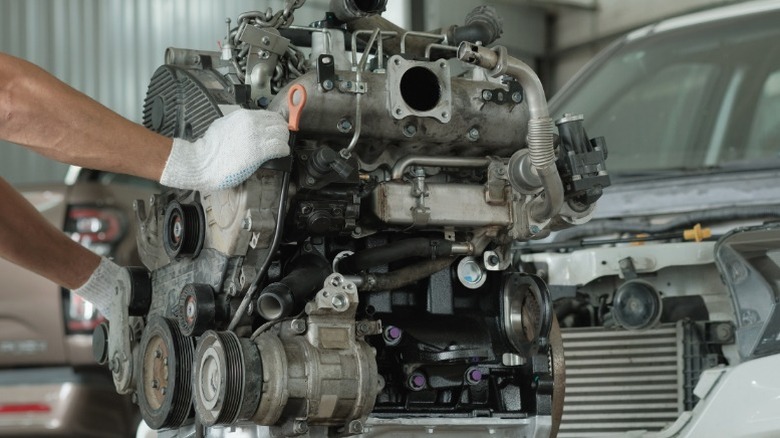Should You Get A New Engine Or A New Car?
The cars we rely on daily for transportation and various other services are sturdy, robust machines. As long as you stick to your manufacturer's recommended maintenance schedule and avoid a handful of bad habits, there's usually no reason your vehicle shouldn't reach at least 100,000 miles or more. However, we live in an imperfect world, and it's not always possible to follow a maintenance routine religiously. Furthermore, many people are not the sole owners of their cars, meaning that they probably had zero control over the vehicle's treatment before buying it. Finally, even the most well-maintained and cared for car can develop wear and tear over time. Freak accidents happen, and mechanical defects can occur, reducing a vehicle's lifespan, even if the owner is meticulous about maintenance.
As you probably know, the engine is a critical component for most mainstream cars. It's responsible for turning fuel, like gasoline or diesel, into the energy necessary to spin your wheels. However, as implied above, even well-maintained engines can suffer damage over time due to age-related wear and tear. If your engine fails, neither you nor your vehicle will get very far down the road, leaving you with a few options: rebuild or repair the engine if possible, replace the engine completely, or buy a new car.
Considering the fact that rebuilding an engine can be extremely time-consuming, many drivers choose to opt for either a new engine or a new vehicle. If you're trying to decide which route is best for you, there are several factors to consider. Fortunately, as a former professional auto mechanic, that's exactly what I'm going to help break down. Here's how to decide whether to get a new engine or a new car.
What are the pros and cons of buying a new engine?
Rebuilding an engine is a lengthy, laborious task that requires extensive training and expertise. While it is often — but not always — cheaper than replacing the engine, the extra time that goes into the rebuild process can make the service unappealing to people who can't afford to go without their primary transportation, leading some drivers to opt for a new engine instead.
First, buying a new engine is generally expensive, especially if you buy one that's truly new, instead of pulling an old engine out of a scrap car. Depending on your vehicle, sourcing a replacement engine could cost you anywhere from around $2,000 to upwards of $10,000. That's a lot of money to spend, especially on an older car that may have other issues besides a bad engine. As mentioned, a rebuild service is usually cheaper than buying a new engine. However, that's not always the case, and it will depend on the type of vehicle and the extent of the damage, as well as the type of new engine you choose to buy.
That said, new engines do have their upsides, too. A new engine can be a wise choice if the vehicle is in otherwise great condition or holds special sentimental value. You can also generally expect a new engine to be reliable, and it's sort of like starting fresh with a new vehicle for a fraction of the price. There are some caveats to that statement, though. For example, if your car is in rough shape overall, a new engine will only solve some of your problems. You'll also have to remember to care for the new engine properly, which, depending on the engine, may involve a new set of maintenance guidelines.
What are the pros and cons of buying a new car instead?
In comparison to buying a new engine, buying a whole new car is usually substantially more expensive. The cheapest new car you can currently buy in America is the Nissan Versa, which comes with a base price tag of $18,330, including the $1,140 destination fee. Comparing that number to the new engine price range discussed above, there's an obvious and huge difference between even the most expensive new engine and the cheapest new car you can buy.
However, there are some other factors to consider. First, there's no reason why you have to buy a brand-new car to replace your old one. You can choose to shop for a used vehicle, and doing so can potentially save you a decent amount of cash, depending on the type of car you buy. It's also worth analyzing your current vehicle's overall condition. If you're trying to decide between replacing the engine in your existing car and replacing it with a new vehicle, there's a decent chance that the engine isn't the only thing wrong with your current car.
There are exceptions to this rule, but if the engine is in such bad shape that you have to replace it or buy a new vehicle, it could be an indicator that the car was poorly maintained overall. If that's the case, you'll have to ask yourself whether you're willing to spend all that money to replace the engine in a vehicle that may experience another mechanical failure down the road. A new vehicle, or even a well-maintained used one, can provide more reliability. Depending on your circumstances, that may be a solid reason to spend some extra money on a new car.


